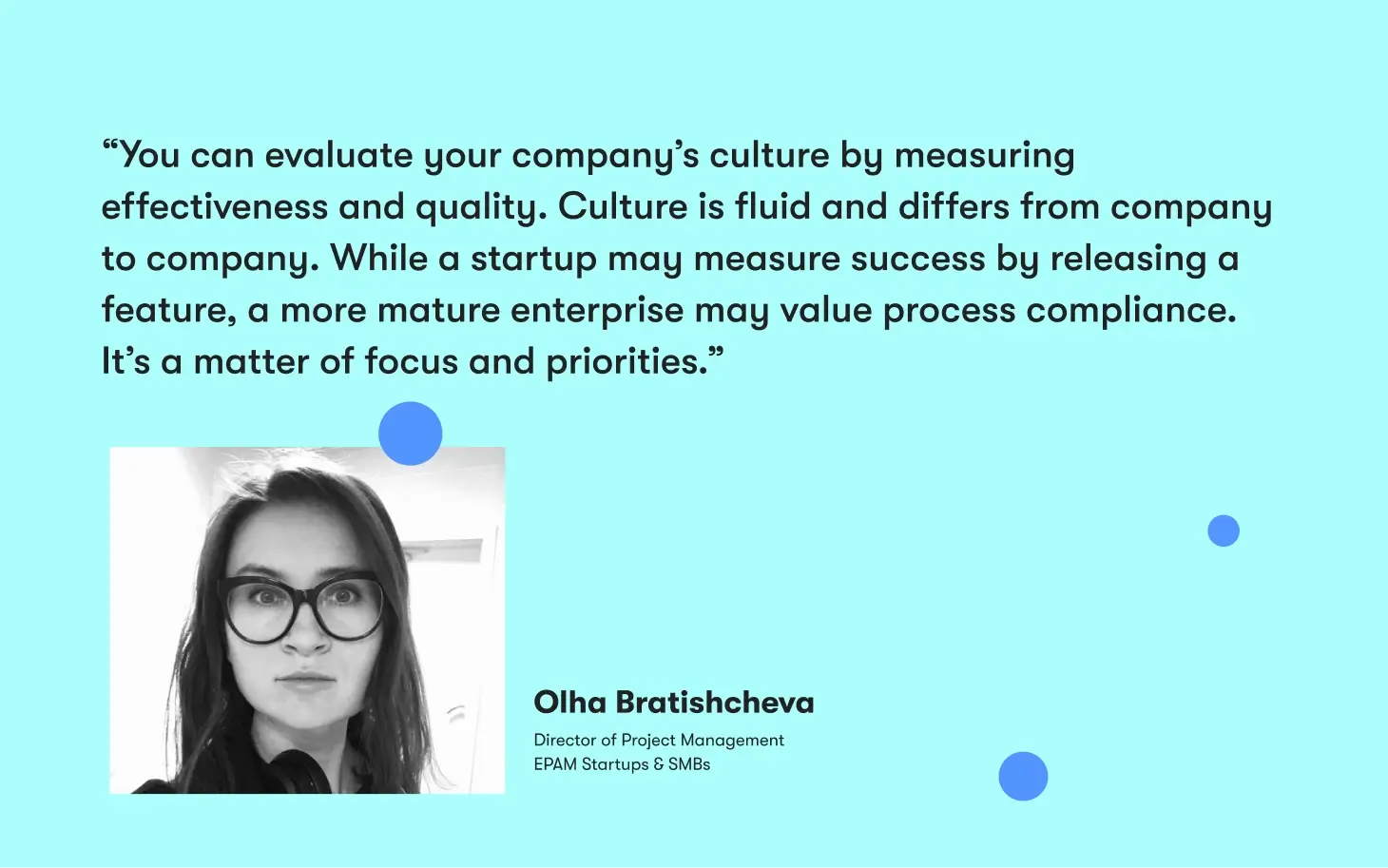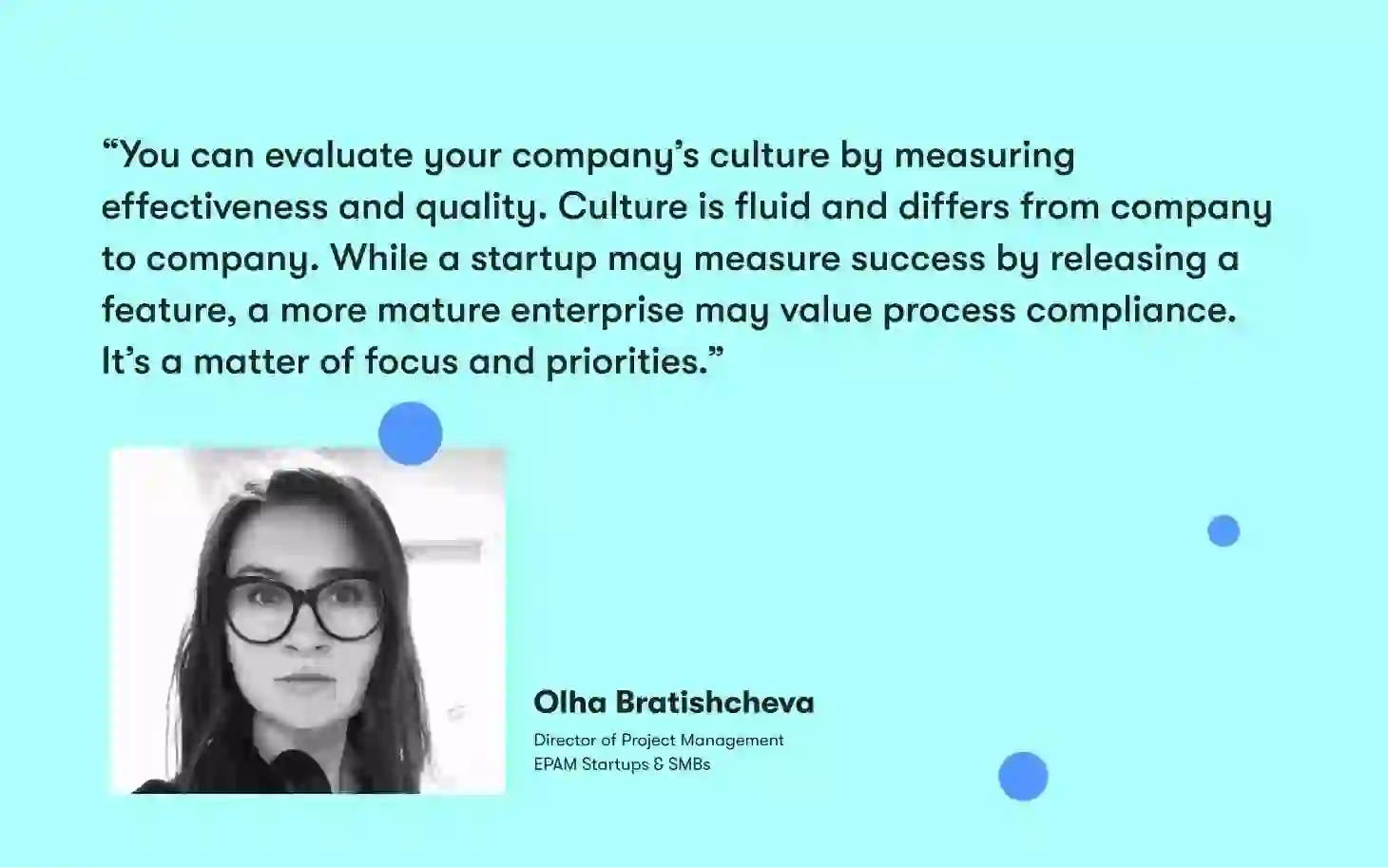With more than 22 years of experience in information technologies as a software developer, team lead, and project manager, Olha Bratishcheva, the Director of Project Management at EPAM Startups & SMBs, shares crucial insight on what culture fit means and how to measure candidates’ compatibility with your company values and environment.
The topic of culture in a corporate environment is often polarizing — it depends on the company defining itself, its management style, its values, and more. Navigating this concept means putting your own meaning into it, and there are no ultimate guidelines on what your company culture should be. However, our distributed teams and global reach allow us to draw from many cases and define the essentials of culture fit assessment.
In this interview, Olha will share her insight into what “workplace culture” and “culture fit” mean and why they matter.
Q: How is workplace culture created, and what does culture fit mean?
Olha: This topic is very broad and contradictory at the same time because everyone has a differing understanding of what corporate culture is. There are many ways to operate this concept, usually putting a custom meaning into it.
When discussing our own corporate culture, we mainly discuss our clients and what it means to fit EPAM’s culture. At EPAM Startups & SMBs in particular, we support startups through our augmented staffing and end-to-end engagement models, so understanding and fitting into a small business culture is vital. It is easier to talk about EPAM’s corporate culture first.
Culture is about more than just being a good person with a good skill set and background. Company culture belongs to the company, not the individual. It’s very complicated and made up of four core elements:
- First, an integral part of company culture is clearly defined values. These range from broad concepts like altruism, integrity, and curiosity to specific ones like customer satisfaction, accountability, and social responsibility. These values define what makes a candidate culturally fit and characterize the company's internal processes and business practices.
- Secondly, while seemingly minor, rituals are great for maintaining company culture and team morale. From giving out badges and acknowledgments for a job well done to informal gatherings, rituals can change how the person interacts with the organization and adopts culture.
- Also, all successful teams need role models whose example they can follow and aspire to. Usually, those are senior team members, leads, or C-level executives. This is why a lot of your culture and internal processes rely on people in immediate decision-making and managerial roles.
- And finally, it’s about operations, or the blueprint of how things get done at your company, which can significantly shape your corporate culture. Many software companies choose to find a fitting SDLC model to characterize their development processes. At early stages, startups and SMBs tend to experiment to find their footing, trying different models for minor projects or per department.
The managerial style can also define the company’s overall culture. If the management is hierarchical, it may take longer for production specialists to greenlight an action or talk to a higher-up person, thus elongating the process and adding steps that a smaller or linear company wouldn’t have. The managerial style also defines the freedom and creativity allowed to the company's employees, which also reflects on the workplace culture.
Q: What about EPAM’s own culture?
Olha: EPAM is a company with a very well-established culture. Of course, being a global organization with 50K+ talents worldwide, it’s impossible to keep it entirely uniform, but it has a strong culture around our engineering excellence.
EPAM positions itself as a company with engineering at the core. At EPAM, all of us, even non-technical specialists, understand and are passionate about engineering and innovation. Our team has established role models — our C-level executives — who are known and followed by everyone. Though, it’s not a person or a group of people who sustain the company culture; it’s the conscious decision of all the people working together at EPAM.
Of course, our clients have their own culture and values. For a company, especially a startup, small or medium business, working with a vendor that understands what drives their company is one of the most important aspects of success. EPAM Startups & SMBs has just the right team to understand and evaluate the organization's processes, rituals, and habits.
When launching EPAM Startups & SMBs, we looked into the struggles startups and SMBs face and how those can be addressed by EPAM quality talent. Customer orientation is at the core of working with startups and SMBs. Simply put, we do everything the customer tells us, but we also know how to do things efficiently and can advise clients on how to optimize the process.
Many of our clients, for example, are focused on efficiency. Catering to startups and SMBs, we understand that speed is vital and focus significantly on feature delivery and productivity. Having the option to hire as few as one developer is essential to smaller companies, as well as having complete control over who is joining them, and how these people deliver value, contribute to the product, and fit within their culture.
It’s also important to remember that when you work with distributed teams and manage remote external talent, they have their own local and national cultures. These cultures don’t classify as corporate culture but still affect it.
When new people join the team, they might change the corporate culture. It might not be evident with just one or two people, but if it’s a lot of people, they can start changing culture. Remember, building a good team is not about finding people that are “like you.” People with different mindsets and backgrounds can enrich and strengthen your culture.
When evaluating for culture fit, bear in mind that it’s not only the value that the person brings to the product and the team but also what we can give them.

Q: Can you train culture fit? If someone’s tech skill set is a great fit, is it possible to train them to fit the company’s culture?
Olha: Culture is not about training, it’s about the environment. If you start to train your culture, you are an army, not a company.
An organization is a living organism. When adding a person, they will adapt to the rituals, functions, and systems. They will embrace how the organization operates and lives in a natural environment. I don’t think you can train values. They should be what people believe in their core or what they are eager to learn.
For example, at EPAM Startups & SMBs, we focus on engineering excellence, so the person joining us should see value in engineering, understand that an engineering mindset is crucial, and take on every opportunity to learn and adapt. The managers, consultants, product owners, operations specialists, and designers that make up our team make a deliberate effort to understand, learn, and embrace the value that EPAM’s engineering excellence offers.
Q: How do you assess cultural fit at EPAM Startups & SMBs?
Olha: At EPAM Startups & SMBs, we find people who can work with our clients, knowing that our talents are already sharing EPAM’s culture and values.
First, we survey our clients to understand what they need, how their teams work, and how we can bring them the most value.
Throughout the collaboration process, we also learn a lot about our clients, and try to immerse ourselves in their culture, values, how things are handled in their organization, and their focus areas. With this knowledge in mind, we perform team fit interviews to pre-select the talent that we offer to our clients. Before all else, we focus on predicting whether this person will thrive in the client’s environment or become toxic, burn out, and fail to bring value.
When staffing for team augmentation or building dedicated teams, we are also focused on setting our people up for success within the environment that the client provides. We do a lot to set expectations, explain client culture, and discuss with the candidate whether they can work in the environment. Also, we emphasize that our people are free to come and talk to their delivery managers and the client about their concerns or suggestions. Yes, we are a company that above all offers top-quality engineering services to clients, but maintaining balance with the talent is also crucial. Even very technically strong professionals may fail in client environments if they are not matched well.
“EPAM Startups & SMBs really showed ownership and diligence; when something came up, they solved it. We would throw problems at them, and they solved them. That is what made the difference for us, and we're very happy about the ownership aspect of the relationship.”

Q: If a candidate fails to pass a culture fit interview, can you still successfully work with them?
Olha: We focus only on two things: setting our people up for success in our environment and adding people who are not toxic to the team we have built.
If we see that someone is toxic or will not thrive with us, regardless of their hard skills, experience, or talent, we’ll reject them to avoid putting our team’s integrity at risk. This is an uncommon issue; we rarely meet people who fit so poorly with our organization. Still, doing thorough reviews is vital so that in the future we do not have conflicts with our clients or within the team.
If someone is not a good fit due to some corporate culture differences, for example, the style of work, we might propose the candidate to the client but give full disclosure to the client and the candidate. These differences can be strictly personal. If the candidate is a perfectionist and only believes in creating a fully-functional solution, while the client needs an MVP, or the candidate is not proactive but delivers excellent results when told what to do, those can be deal breakers for some and compromisable situations for others.
UPSCALE YOUR TEAM’S CAPABILITIES
With 50K+ tech experts across 400+ locations globally, EPAM Startups & SMBs is a trusted partner for businesses looking to meet their software engineering needs fast.
Q: What are some vital questions to ask when conducting a culture fit assessment?
Olha: While there is no single rule for how to assess culture fit, there are established practices and techniques to help you be prepared to interview candidates.
Remember that there are risks involved whether you are hiring in-house employees or engaging external experts. You need to accept the risk that you can’t assess 100% of a person's cultural fit. However, there are some culture fit interview questions you may ask when assessing to get a better picture of the candidate's values and compatibility with your organization.
Question #1: How do you envision your perfect work environment?
As we already discussed, most of the culture fit interview questions you ask during the assessment have no right or wrong answers. Companies and people who work there vary, so culture fit interviews are meant to assess the candidate's compatibility with just one company — yours.
When asking about the candidate’s ideal work environment, try to calibrate their response to how your organization operates, and evaluate whether their comfort zone lies within what your company has to offer.
Question #2: What’s your work-life balance like?
Even though the healthiest way to go is to promote work-life balance, in many fast-paced young companies, urgent requests might come up outside work hours. This is especially true for global teams in different time zones, and being there to fix bugs and production issues at any time is valuable to some companies.
Question #3: Are you a team player or do you prefer to work alone?
Again, the “right answer” to this question depends on the company’s culture. Some companies need multi-competent team members to take the lead and perform various tasks, while others need communicative team players who contribute to the group.
This question helps you understand the candidate's personality and motivations, and perform a well-rounded culture fit check.
Question #4: Describe the most stressful work situation you’ve been in.
With this question, you can understand their perception of stress and level of stress tolerance. The answers may vary from a confusing email from a colleague to being fired on the spot. This can help you determine the potential longevity of a candidate as your team member and whether they can be a good fit for your work environment and team dynamics.
Question #5: What are your expectations from management?
A candidate’s answer to this question tells you a lot about their approach to work and the people around them. If they expect to be spoon-fed and get unconditional attention, they won’t succeed in an environment where the company values leadership and initiative. On the other hand, some candidates will expect to have more freedom and space for creativity, which is fine for some companies but might not fit with the culture of others.
MATCH WITH OUR TOP-VETTED EXPERTS
Our team offers engineering expertise in 100+ technologies with top-tier vetted experts ready to join you in 4 weeks or less.
Q: What advice would you give to startups and SMBs interviewing vendor talent, especially if they haven't found their footing?
Olha: The best advice is to do situational interviews. You might be surprised when a person who gave you a poor first impression turns out to be exactly what your organization needs.
Another thing is to be open-minded about people from different cultures. You might not expect it, but if you are patient and tolerant, they can become a great asset. Perfect fit doesn’t always exist, and sometimes people who don’t seem like a great fit can bring the most value to your team and the project. I’d suggest not looking for perfection but for an excellent addition to the team. Often clients see great results when they are not looking for a perfect fit but for what their team is missing.
Be open and give chances for people to be successful. A candidate may underperform if they are not given enough opportunity or support or simply lack crucial information.
How EPAM Startups & SMBs supports you through talent selection
As a global software engineering vendor for startups and SMBs, we engage with clients and talent from different locations, backgrounds, and corporate cultures. Our main focus is creating an environment where top-tier resources fire up smaller teams and small-scale engagements. EPAM Startups & SMBs’ project management teams hold a holistic and consolidated view of how things should work in vendor-client cooperation, allowing us to be a trusted vendor and a strategic advisor and ensuring all teams function like clockwork. We share all the challenges our clients face and add value by providing industry-leading expertise and managing operational hurdles as a team.
Start a collaboration with a partner who understands
EPAM Startups & SMBs is a global partner to companies looking to expand their capabilities with talent that fits both their cultural and technical requirements. Start excelling with EPAM quality talent on your side.

Having experience as a software developer, team lead, and currently the Director of Project Management at EPAM Startups & SMBs, Olha has vast expertise in assessing and understanding culture fit. Overlooking project management across our talent network, Olha shares invaluable insight on culture fit assessment best practices.
Having experience as a software developer, team lead, and currently the Director of Project Management at EPAM Startups & SMBs, Olha has vast expertise in assessing and understanding culture fit. Overlooking project management across our talent network, Olha shares invaluable insight on culture fit assessment best practices.
Explore our Editorial Policy to learn more about our standards for content creation.
read more


















